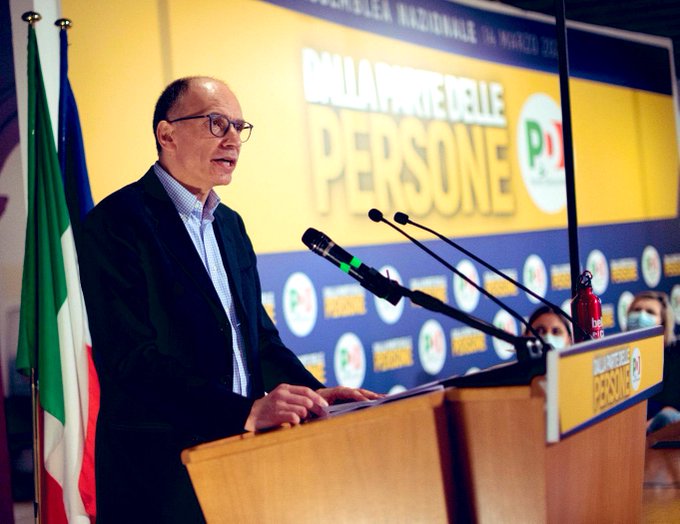Why is Enrico Letta anxious to cover himself on the left?

The first moves of the Pd secretary, Enrico Letta, analyzed by Gianfranco Polillo
Everything can be said about Enrico Letta, unless he is a man of the world. Solid basic culture. Deep knowledge of the mechanisms that support an evolved society. International experience. World attendance of European elites and beyond. Belonging, which is not bad, to one of the most prestigious Italian families. Just think of Uncle Gianni. And then the entrances to the Vatican. Although in this case, it is difficult to say whether they are destined to operate in the name of modernity, given the preaching of Pope Francis. All qualities that we would have preferred – but we do not despair – to find immediately transfused, right from the start, in its political management.
And instead, beyond the grace of man, there is something unexpected. The prevalence of an identity vision that does not reconcile with that pragmatism which, in the past, represented the main source of his way of operating. On the ius soli, opinions can be different. There is no doubt that once the migratory flow has stabilized, the problem must be faced and solved. But is this the current stage? A problem of iure contendo does not lend itself to being evoked in a moment, like the one, that Italy is experiencing. And in which all efforts, in a united breath, should be directed towards the fight against the pandemic.
Second problem: the vote for sixteen year olds. Captivating proposal, there is no doubt. But also eccentric with respect to a common feeling. Moreover, if we are not mistaken, such a low limit, in Europe, is provided only for the Austrian Nationalrat. In all other cases, the 18-year rule applies. Letta then runs forward so as not to fall behind. Italy's anomaly in the Senate is evident. In the overwhelming majority of European countries at the age of 18, not only do you vote for the Senate, except in the cases of indirect elections. But at that age, with some exceptions (Greece 25, Ireland 21), one can also become a senator. When in Italy it takes 25 years to vote and 40 to be elected, as provided by article 58 of the Constitution.
A constitutional amendment law has long been presented in Parliament, which ran aground after the first vote. Beyond the normal political quarrels, the danger of making the Chamber of Deputies and the Senate even more photocopy has been paralyzing. The umpteenth demonstration, after the decision to reduce the number of parliamentarians, outside a more general context of reform, of the risks involved in putting the "screwdriver" of which Letta himself spoke, in a socket. The danger is a recurring short circuit.
However, the episode that caused the most discussion was that tweet on the amnesty. "Bad start for Salvini – chirped the new secretary – he held the Council of Ministers hostage for an afternoon". Today replicated by the intervention in the Press by Roberto Gualtieri, the former Minister of Economy and candidate, even if only for a few weeks, for the future mayor of Rome. "The League – he roared – stop making propaganda". Evidently referring to how things had gone about the cancellation of the oldest tax bills, with their double constraint: 5 thousand euros and the limit of 30 thousand for the taxpayer's income.
We know that the "taxes" argument for the Democratic Party is extremely indigestible, unless it concerns its own social block of reference. Up to an income of less than 40 thousand euros, you can operate with various bonuses and benefits. On the remaining part of the taxpayers – the 13 per cent that contributes 50 per cent to the total tax burden – we can continue to hit hard. In Gualtieri's breezy "à la Tedesco" reform, an algorithm was thought of to further raise the curve, to increase the average tax rate for incomes exceeding 75 thousand euros. That alone, despite being only 2.5 percent of taxpayers, contribute 28 percent to it.
Beyond the merits, however, a political problem remains. Did the criticism of the Democratic Party exponents hit the League or did it instead target Mario Draghi himself, albeit in a translated way? Not a strange question given what the Prime Minister himself admitted: "it was an amnesty, but made necessary following the dysfunctions of the collection system, which must be reformed." What evidently escaped the former Minister of Economy. There remains therefore the same question that had contributed to determining Nicola Zingaretti's own resignation. Is the Democratic Party working to deliver Mario Draghi to the center right? Where did Sergio Mattarella's warnings go, when he urged unity, necessary to fight the pandemic?
But to return to Enrico Letta, the problem is not a small one. If a character, who has the characteristics indicated at the beginning, is forced to cover himself to the left, in such an embarrassing way, what is the reason? We have no answers, but mere suspicions. It is the heavy conditioning of that party's culture. Not everything for the truth. Because there has always been a reformist component. Do you remember the best players? But they always counted for less than nothing. With the great paradox of Giorgio Napolitano. The only President of the Republic called to this position by popular acclaim. Indeed of the great voters. But always put on the sidelines, in the real management of the party. Which will remain what it always was. Walls like the one in Berlin can fall with a crash. But, as the saying goes, there is no worse deaf than someone who does not want to hear.
This is a machine translation from Italian language of a post published on Start Magazine at the URL https://www.startmag.it/mondo/perche-enrico-letta-ha-lansia-di-coprirsi-a-sinistra/ on Mon, 22 Mar 2021 09:16:21 +0000.
